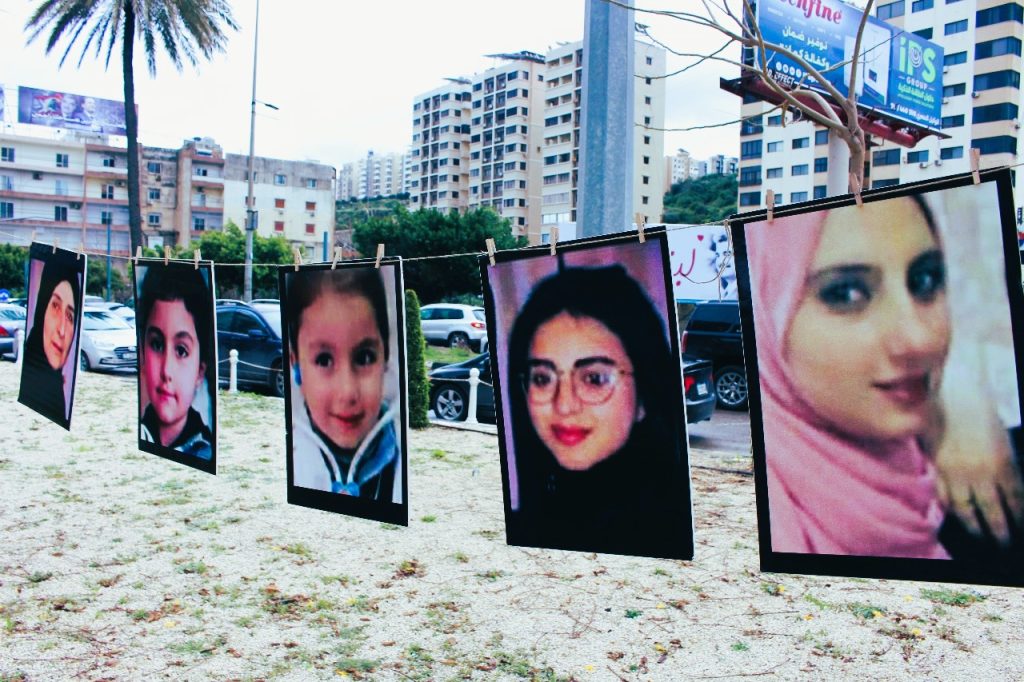Cedar Centre For Legal Studies
case study
The April Boat Tragedy: Between Proving the Disappearance and Seeking Justice
31/07/2025

Introduction:
Amid the unprecedented economic and social collapse Lebanon has been experiencing since 2019, the repercussions of the Syrian crisis, the collapse of the local currency, and rising unemployment and inflation rates, irregular migration from the Lebanese coast has increased, particularly from marginalized areas in northern Lebanon, such as Tripoli, one of the poorest cities on the Mediterranean. Among the most tragic incidents occurred on 23 April 2022, when a boat carrying approximately 80 migrants sank off the coast of Qalamoun in Tripoli, resulting in a number of deaths and missing persons.
Timeline and Incident Details:
Survivors reported that the sinking of the boat resulted from the intervention of a Lebanese Navy corvette, which pursued the boat before it reached international waters, leading to a collision and sinking. The following day, the Lebanese Army announced the rescue of approximately 45 people and the recovery of seven bodies, including a child. Thirty-three people remain missing as of the date of this report.
On 26 April 2022, the Lebanese Army announced that the Lebanese Intelligence Directorate would continue the investigation at the request of the Government Commissioner to the Military Court. This raised significant legal concerns due to the lack of independence of this body from the security agencies involved in the incident, which contravenes the Minnesota Protocol regarding the investigation of suspicious deaths.
On 14 June 2022, 11 lawyers, led by human rights activist Diala Chehade and lawyer Mohammad Sablouh, director of the Legal support Program at the Cedar Centre for Legal Studies, filed a criminal lawsuit before the Military Court on behalf of four survivors against 13 members of the Navy, accusing them of premeditated and unintentional killing under Articles 548, 189, and 550 of the Lebanese Penal Code. They also called on the Minister of Justice to transfer the case from the Military Court to the Judicial Council on 16 June 2022.
International Support and UN Action:
In conjunction with the growing local demands to uncover the truth and hold accountable those responsible for the boat sinking off the coast of Tripoli, a remarkable international movement has emerged from human rights and international organizations. MENA Rights Group, in coordination with the Cedar Centre for Legal Studies, and on behalf of several families of the victims, submitted a communication to the UN Special Rapporteur on extrajudicial, summary, and arbitrary executions and the Special Rapporteur on the human rights of migrants. The letter called for an independent, transparent, and prompt investigation into the circumstances of the incident, with a focus on whether excessive force was used by the Lebanese Army or any other security force during the pursuit or interception.
Based on this communication, UN human rights experts sent an official letter to the Lebanese authorities on 21 September 2022, expressing deep concern over the absence of an independent and effective investigation, the potential violation of the right to life, and the lack of accountability. They also stressed the importance of respecting the rights of victims and their families to know the truth and achieve justice, and called on the authorities to provide appropriate compensation to those affected and ensure that such incidents do not recur in the future. This UN action has given the issue an international dimension and helped keep it on the agenda of human rights discussions in Lebanon.
Technical Developments:
In August 2022, the American submersible “Pisces VI” submarine arrived in Lebanon as part of a humanitarian mission to locate the wreckage of a sunken migrant boat off the coast of Tripoli. Using advanced sensors and high-resolution cameras, the submarine’s technical team was able to accurately locate the wreckage at a depth of approximately 450 meters (1,470 feet) below the sea surface. The scan revealed remains of at least ten victims inside and around the vessel. Despite these significant findings, the submarine was unable to recover the bodies due to technical challenges associated with the great depth and the lack of equipment necessary to safely remove the bodies from the seabed.
After completing the reconnaissance mission, the submarine left Lebanese waters on 28 August 2022, leaving behind numerous questions about the fate of the remaining victims and the need to complete the search and recovery operations using specialized equipment for this type of complex operation.
Cedar Centre for Legal Studies Advocacy and Follow-Up:
As part of its ongoing commitment to irregular migration issues and victims’ rights, the Cedar Centre for Legal Studies held three consecutive events on 6 February 2023, 2024, and 2025, coinciding with the International Day of Remembrance for the Dead and Missing at Sea and at Borders. Each focused on the April Boat tragedy alongside similar cases, featuring joint statements from Lebanese and international human rights groups demanding accountability and safeguards against recurrence.
The 2024 event included a 30-minute 3D documentary titled “The Death Boat: Migrants Drowning in Their Own Sea,” jointly produced by February Network, Megaphone, and Cedar Centre, reconstructing the event and concluding with a plausible scenario of the sinking.
The 2025 event announced progress in the legal path and the submission of a draft law to recognize the boat victims as martyrs in the Lebanese army. Over ten MPs signed the proposal, now awaiting parliamentary approval. Meanwhile, the families of the victims are visiting several representatives to urge them to pass the law before the end of the year.
On 27 July 2025, the Center submitted an official request to increase the amount of assistance to $20,000 per family, to be secured by donors, pending government approval.
Detailed Legal Follow-Up:
Despite the submission of all evidence proving the involvement of an officer and several members of the Lebanese Army in this tragedy, the Government Commissioner to the Military Court dismissed the complaint without taking any action, and the case was set aside without further follow-up. In response, the documentary above mentioned was released and a motion to expand the probe was filed—so far without results.
In light of the continued failure to assume judicial and administrative responsibility for the April boat case, a delegation of lawyers from the Cedar Center for Legal Studies, along with a delegation of the victims’ families, met with Lebanese Prime Minister, Mr. Nawaf Salam on 19 June 2025. During the meeting, details were presented of the complete absence of any serious path to justice, whether by the military or civil courts, and the impact of this negligence on the victims’ families and their right to know the truth.
Prime Minister Salam expressed a clear interest in the case and, following the meeting, directly contacted the Minister of Justice, requesting him to pursue the case judicially and take the necessary measures to ensure justice and accountability, in line with Lebanon’s constitutional and human rights obligations. The Cedar Centre is currently following eleven legal cases involving the boat victims. These cases relate to procedures for proving their disappearance, in preparation for removing them from official records after their deaths are declared, enabling their families to receive social assistance. These procedures include:
- On 4 and 5 February 2025: Powers of attorney were organized.
- On 26 February 2025: Complaints of Missing persons were submitted.
- On 27 February 2025: Official notifications were issued.
- On 17 March 2025: Court ruling to publish the missing names in the Official Gazette
- On 25 June 2025: A hearing occurred that confirmed 30 missing and collected witness testimonies per file.
Conclusion:
Through this process, Cedar Center underscores the urgent need for a serious, independent investigation into the April Boat incident and for holding those responsible accountable under international human rights standards—particularly the Minnesota Protocol.
Revealing the full truth and assigning clear accountability is not just a legal requirement—it’s a moral obligation to the victims and their families, still suffering under the weight of injustice and loss.
Cedar centre also emphasizes that what happened in April 2022 was not an isolated incident, but rather falls within a broader context of policies that fail to protect economic, social, and political rights, particularly for marginalized communities and refugees, and in light of the increasing phenomenon of irregular migration due to the deterioration of living conditions in Lebanon.
Based on its legal and human rights responsibilities, the Cedar Centre is committed to continuing this path, including providing full legal support to the families of the missing, working to push the Lebanese state to officially recognize the victims of the boat disaster, and adopting a draft law that enshrines this recognition and preserves the dignity of those who drowned. The centre will also continue its documentation and advocacy efforts locally and internationally to ensure that this tragedy is not repeated and that long-awaited justice is achieved.
